Inside: Do you believe any decluttering lies? These are the common misconceptions about decluttering and what is actually true.
Almost everyone believes some things that aren’t true about decluttering.
Today I’m going to tackle the most common misconceptions I hear about decluttering and tell you what’s actually true.

Decluttering Lies
You may not believe all of these lies, but I’m going to guess at least a few of them will resonate with you. No matter where you are on your decluttering journey it’s important to think through your mindset. You need to know what you believe and why.
Often these lies go unchecked. They’re part of our subconscious and we don’t even realize we believe them until we take the time to process through it.
22 decluttering lies you may believe
Notice what decluttering lies you may be believing so you can work on overcoming them. Don’t stay shackled to your stuff, but instead combat the lies with truth and find freedom as you learn to let go.
1. I need to have a lot of time in my schedule.
People are busy. We have a cultural epidemic of busyness. The idea of adding something else into the schedule may be overwhelming.
The mountain of clutter can cause us to think that we need to have a lot of time available in your schedule to deal with it. But the truth is a lot can be accomplished with 10-minute decluttering sessions.
Commitment and consistency are more important than having large blocks of time in your schedule.
2. I have to get it all done in a weekend.
I see Pinterest pins often about decluttering your home in one day or in a weekend. There are people who tackle it head-on and all at once that way, but it isn’t common.
The truth is you can slowly declutter over a longer period of time. There is no set schedule or rules for the pace at which you work through your stuff. You get to decide what works for you.
3. I should only have to declutter once and be done.
While it would be nice to think that doing one major declutter would solve all of your clutter problems from here until the end of time, that isn’t realistic for most people.
The truth is if you are ruthless on round one perhaps you don’t need to do any major purges again, but there will always be a need for maintenance. The world is constantly adding to our clutter. Anyone who has a school-aged kid can attest to that.
While you can do your best to be vigilant with what enters your home, you’ll likely still want to do some light decluttering as part of a maintenance routine to make sure you don’t have too much stuff trying to sneak in.
4. I will regret getting rid of it.
Fear is a big reason people struggle to let go of their clutter. The idea that they could get rid of an item that they can’t replace with the exact same item can paralyze some people.
The truth is it is possible you could regret letting something go, but the likelihood is small. The weight of continuing to carry the burden of excess is greater than a slim chance of potential regret.
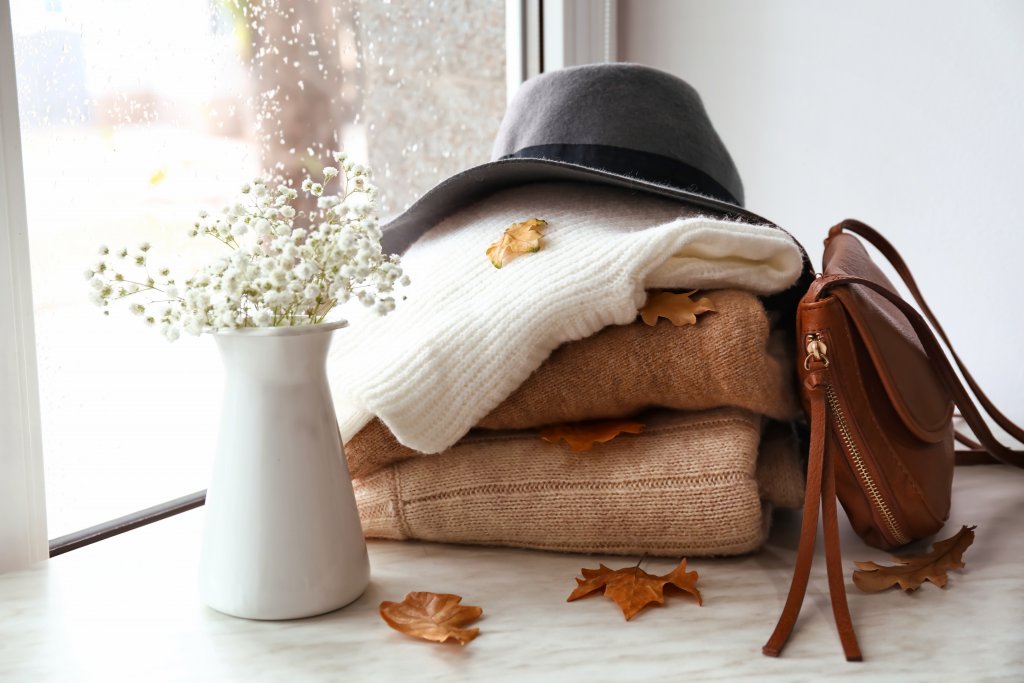
5. But it could be useful.
I hear this reason often for why people want to hang on to their clutter. Yes, the item could be useful, but are you actually using it? Just because the item still functions doesn’t mean it is something that you need.
The truth is it could be useful, but if you aren’t using it it’s not useful to you. Let it go so that someone else can make use of it.
6. This item has sentimental value so I can’t let it go.
Sentimental items trip many people up in the decluttering process. That’s why I recommend dealing with them last as they can be the most emotionally charged things people own.
The truth is holding on to everything with a memory attached will land you in a house full of clutter. Your memories aren’t gone if you decide to let go of that item.
If you’re holding on to things because they belong to someone who passed away, don’t feel guilty if you don’t want to keep all of their things. We don’t honor someone’s memory by hoarding what they owned.
Be selective in what sentimental items you keep. Fewer is more meaningful.
7. All decluttering systems are equally good.
While there are various methods for decluttering your home, that doesn’t mean each of them would work equally well for you.
The truth is while each decluttering system may have some merit to it, that doesn’t make all of them a good fit for you. Decide which one will work best for your personality and go from there.
8. There is one ‘right’ way to declutter.
I just said one of the decluttering lies is that all methods work equally well but this one is that there is no one ‘right’ way to declutter. People can spend too long reading books on decluttering hoping to find the Valhalla answer.
But the truth is there is no one magic perfect solution. I created my decluttering system by taking from various approaches and modifying them to what I thought worked best. You should do the same.
Don’t feel like you need to search for the perfect answer because there isn’t one. Yes, take advice from brilliant bloggers who have carved a path, but also blaze your own trail. Take imperfect action to make progress.
9. I have to become a minimalist.
When the topic of decluttering comes up, people have various images that come into their mind. For some, it’s Marie Kondo and her unique system and approach to folding. Others imagine a barren home which is their idea of what minimalism looks like. For the record for most minimalism does not look like that.
The truth is you also don’t have to become a minimalist or even want to become a minimalist at the end of your decluttering journey. This is why I focus on simplicity, not minimalism.
Create your own unique decluttering goals that fit with what matters to you. Don’t feel like you need to live up to any expectations. There are no rules other than the ones you create.

10. I can do it alone.
There are people who have success decluttering on their own. But there are also many other people who struggle and have a really challenging time feeling alone in the process.
The truth is it’s easier to declutter when you are part of a like-minded group. An encouraging community that cheers you on can be very helpful.
For some people hiring a professional organizer who specializes in decluttering to assist in a particularly challenging room can help you make lots of progress much quicker than you’d be able to on your own.
11. Clutter is inevitable and will come back so why try?
Well, that is a defeatist attitude. This line of reasoning would also go along with why make the bed and why bother to put things away when you are going to get them back out again.
While there is some truth to there being a certain amount of clutter that enters your home, that doesn’t mean give up the fight and accept defeat. It means looking at the sources of clutter including your own shopping habits.
12. My spouse, kids, or their grandparents will ruin my progress.
Ah yes, I hear this one a lot. My spouse and my kids aren’t on board with decluttering. This is one of the decluttering lies to pay special attention to.
While it may be true that others in your household (or others who buy things for people in your household) don’t share your desire to simplify, that doesn’t mean you don’t continue to do it.
The truth is you need to focus on your stuff and declutter what you can. You can’t force other people to change, but maybe you can inspire them. Don’t give up on your goals just because not everyone else is on board.
13. I’ll get good money for the stuff I paid good money for.
I’m so sorry to tell you this, but the things you buy are worth significantly less the moment you walk out of the store with them. It can be hard to part with items you spent a lot on but aren’t making use of.
The truth is those items become expensive clutter. If you don’t love them and use them then they aren’t benefitting your life and instead serve as a reminder of past purchasing mistakes.
If you think your items are worth something, you can try to sell them but for most people, it isn’t worth the time and effort for the return.
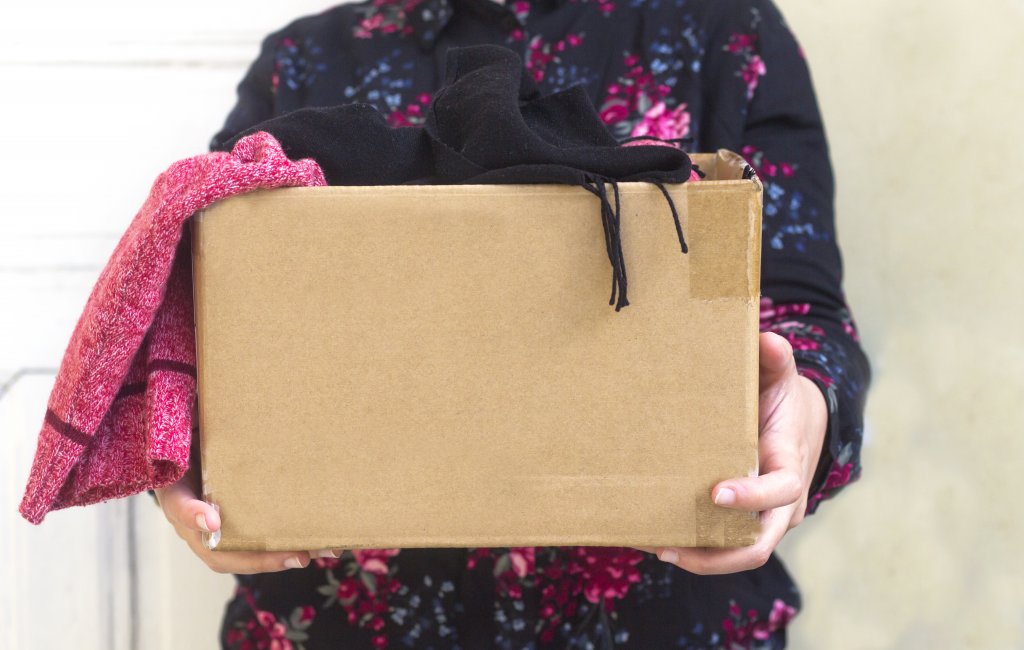
14. Donating clothes will go to people who need them.
While hopefully, your clothes will go to someone who needs them, statistics on clutter tell us that many of the clothing items donated end up being recycled.
That doesn’t mean you shouldn’t donate clothes because that does give them a chance at a second life, but it does mean that buying less is best so it’s important to be intentional with how you shop.
15. There is no good way to dispose of clutter.
When some people realize the perils of donating they think well there is no way to get rid of it so I’ll just keep it. That’s not doing anyone any favors.
The truth is you can donate items responsibly. I think it’s ideal to give to the end-user either through someone you know personally, through an organization, or your local buy nothing group.
16. It’s just about the stuff in my house.
For most people, the word clutter conjures up images of houses overflowing with stuff. While that is real and true, clutter also comes in other forms.
The truth is your home can be decluttered but you can also have emotional clutter, digital clutter, and/or a cluttered schedule. These types of clutter may not be as obvious but they are still a burden.
17. I will be forced to get rid of things I don’t want to.
No one should be forcing you to do anything. The process of decluttering may change the way you think and feel about your stuff so that you choose to get rid of more things, but no one should be prying items from your hands.
You get to decide what is important to you and what isn’t. Hopefully, through the process, you will learn to be even more grateful for what you already have.
18. But I don’t want to hurt the feelings of the person who gave this to me.
This is one of the decluttering lies people believe even though it is rarely true. People don’t generally gift items hoping that you will hang onto it even if you don’t like it or use it.
The truth is most people who give gifts want the item to benefit the life of the person they gave it to. It shouldn’t be a burden nor should it hurt anyone’s feelings if the item wasn’t a good fit.
If the item is getting good use in your home, give it to someone who would use it instead.
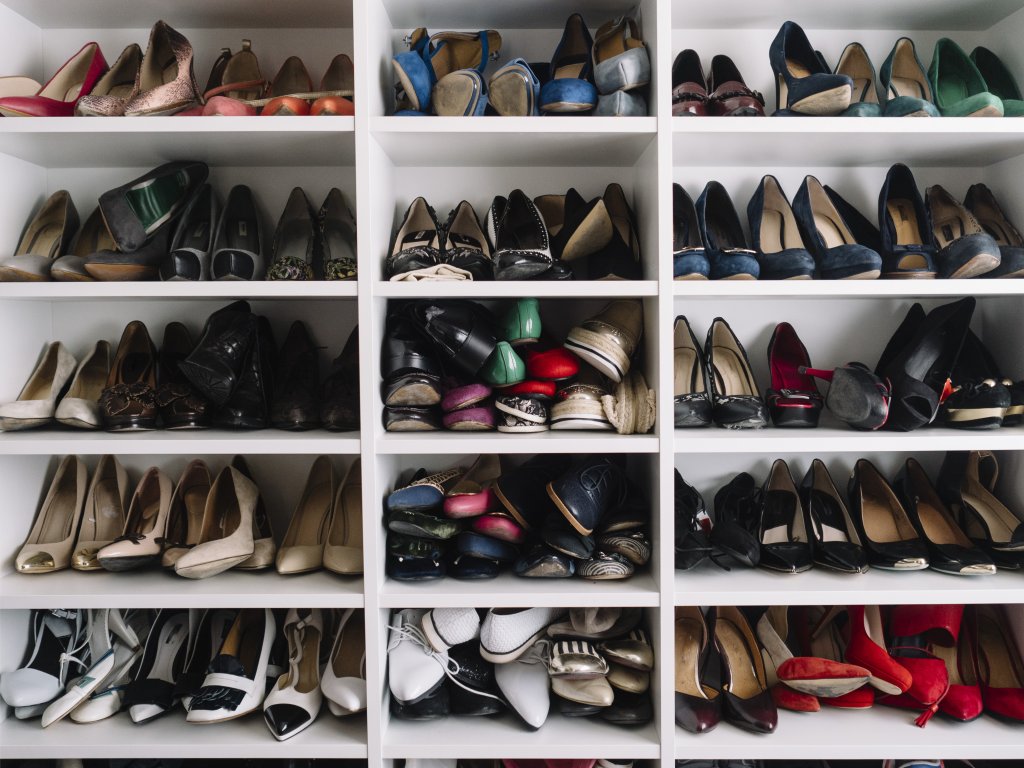
19. But I love — and more of them is always better.
There are many collectors in the world. For some the collection of choice is books. For others, it’s owl figurines or mugs. For some women shoes, purses, or jeans may be items where the thought is that more is better.
The truth is that when you have too much of something it becomes clutter. It’s harder to know what you have and to let the most favorite items shine when they are drowned out by the sheer amount of items.
20. My kids will want this later.
This is one of the decluttering lies many people are telling themselves. They’re holding onto clutter for far too long believing someone in the next generation wants it when the truth is they usually don’t.
Have open and honest conversations with family members. Find out if anyone wants the things you are saving for them. Be ok with accepting it if they don’t.
21. I don’t have time to declutter.
This is a matter of priorities. The truth is people make time for what is most important to them. Your stuff sucks up your time regardless.
You are either going to continue to spend more time cleaning and picking up or you’ll set aside time to declutter to save you more time later. You get to decide which one you prefer.
22. My house will look boring without this stuff.
No one said you have to be a minimalist or get rid of everything. The point of decluttering is to be more selective with which items you keep. This lets the items you love most stand out because they aren’t crowded with clutter.
The truth is you can have a beautiful cozy home that’s decluttered. You can choose to have a cozy minimalist home if that’s what you want. Decluttering should highlight your style, not diminish it.
So which of the decluttering lies did you find resonated most with you? I hope the truths you read about them encourages you to keep moving forward in your decluttering journey.
Want to stay up to date with The Simplicity Habit and get some help getting started decluttering? Fill out the form below and get the Your Home Decluttered Jumpstart worksheets. They will list easy places and easy items to declutter to help you get started.







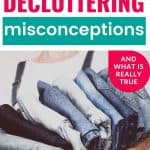
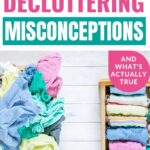
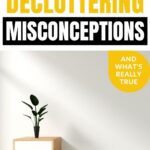


Though I agree with most of the items, unfortunately I have a MIL who absolutely looks for the things she gave you and openly criticizes anyone who parts with something she’s given. That is a reality for many people.
Hi Jane. Yes, that’s true that it may be a reality. At that point, you get to choose if you want to keep stuff you don’t want to please her or let it go and deal with the ramifications. Not fun options, but if other people give you things to make you feel guilty that is on them not on you.
For #15 There’s no good way to dispose of clutter. I find it helps to remember that every thing you own will, eventually, be someone’s trash. Yes, de-clutter responsibly when you are able, if you’re able, but holding onto something that you can’t find a new home for is basically using your own home as a landfill. Similarly, don’t ‘donate’ unusable items to charities–if it’s going to land in the bin anyways, be brave and do it yourself and spare them the waste of time and money. Is it awful that we generate so much trash? Absolutely. Does that mean you have to keep all your trash in your own home forever? Absolutely not. Forgive yourself, free yourself, and work toward not repeating the pattern in the future.
Thanks for this list.
It is helpful!!